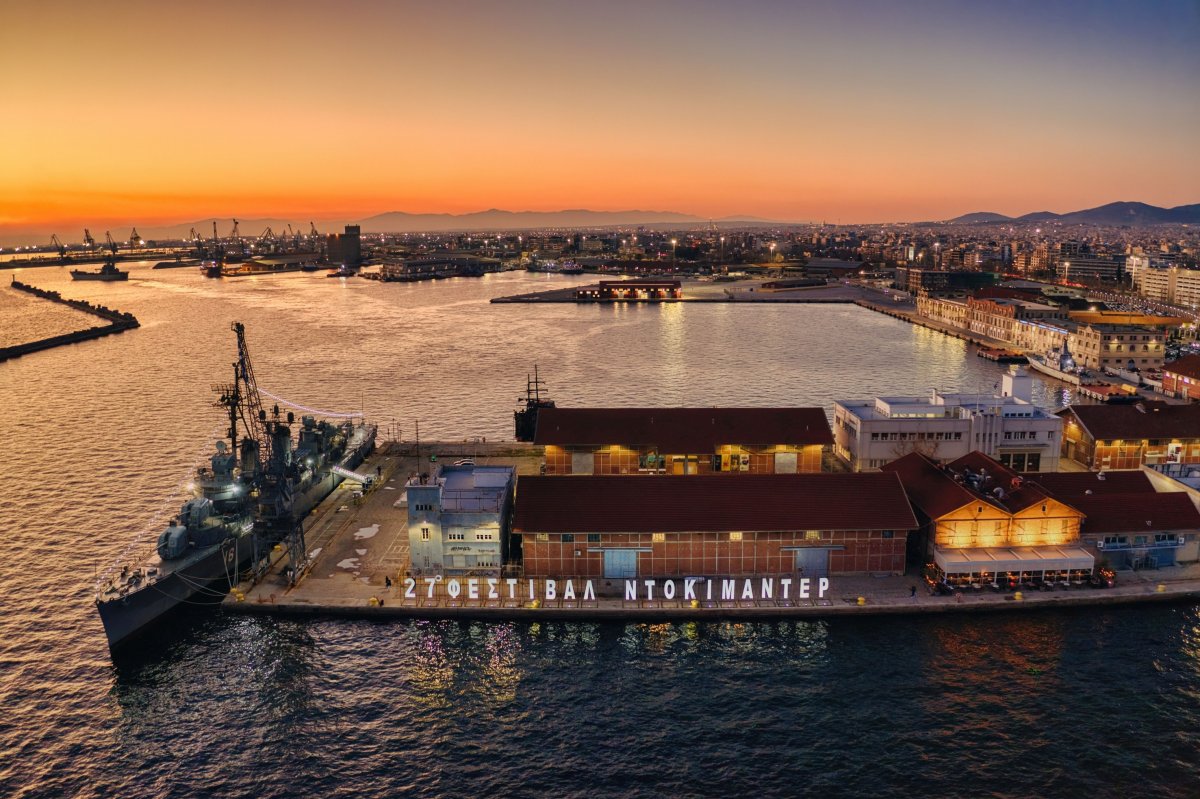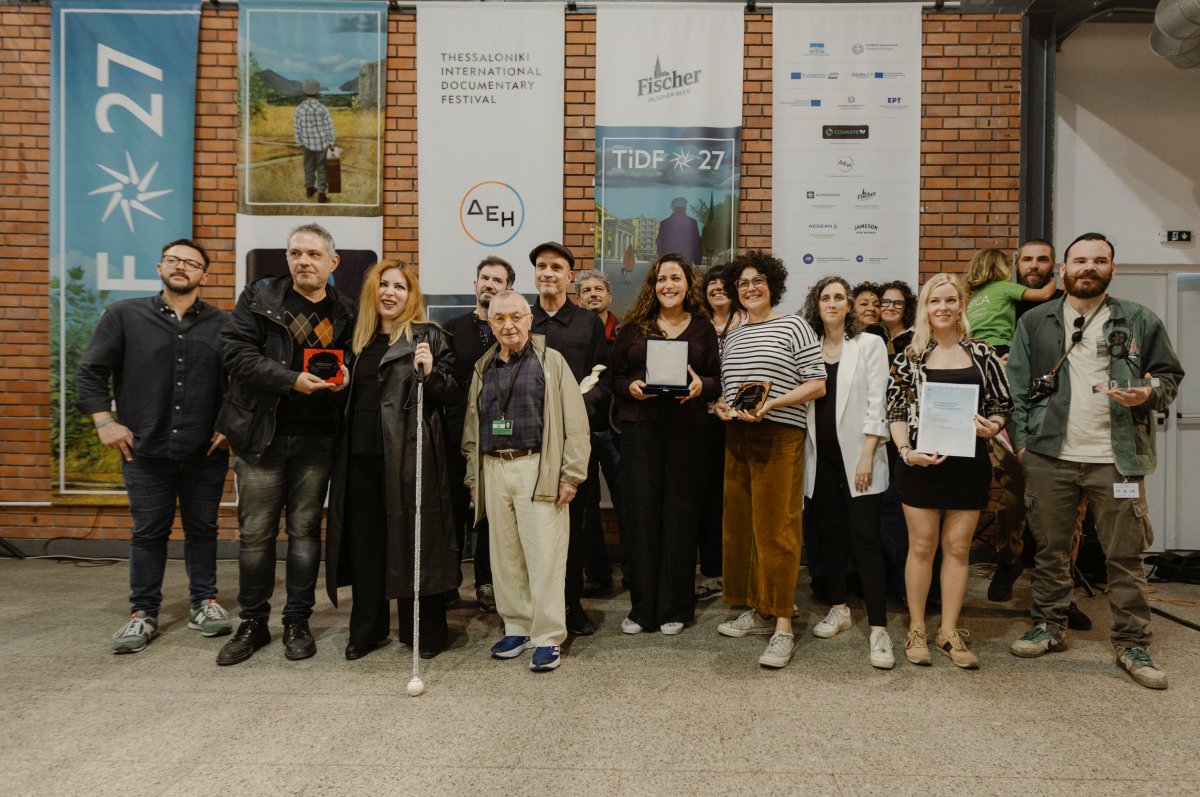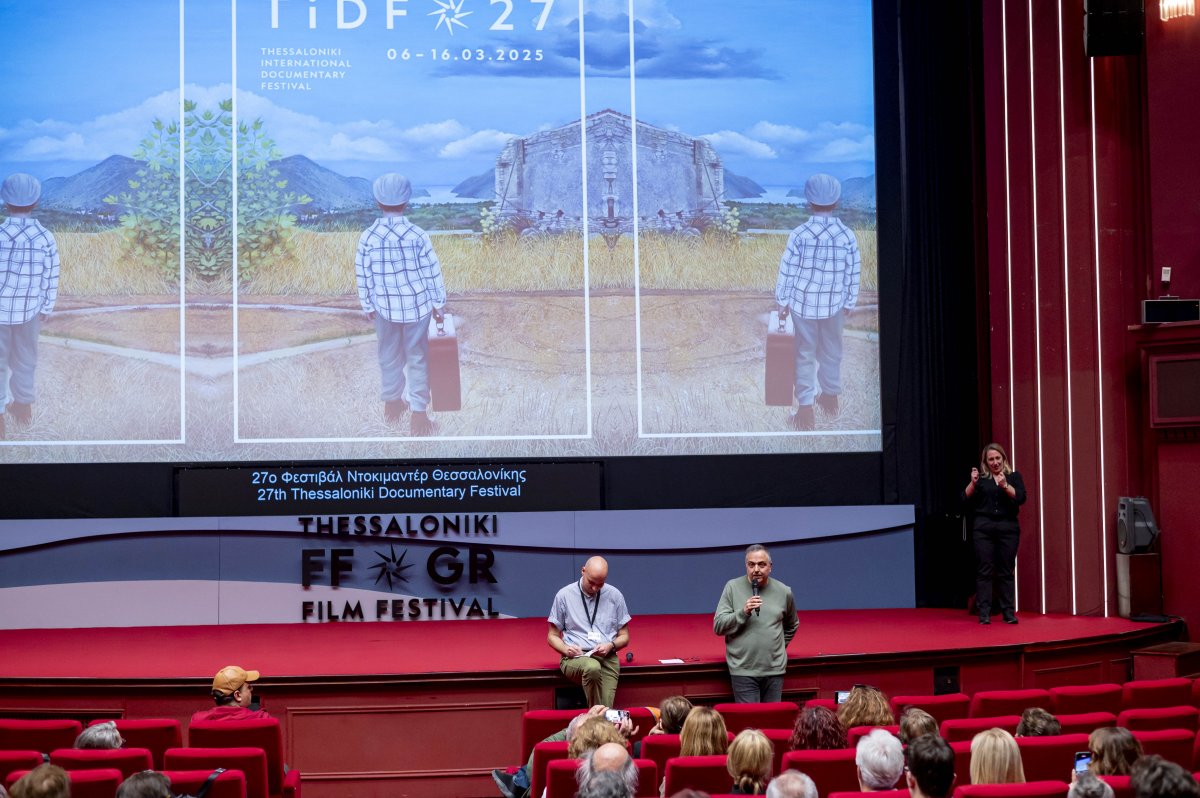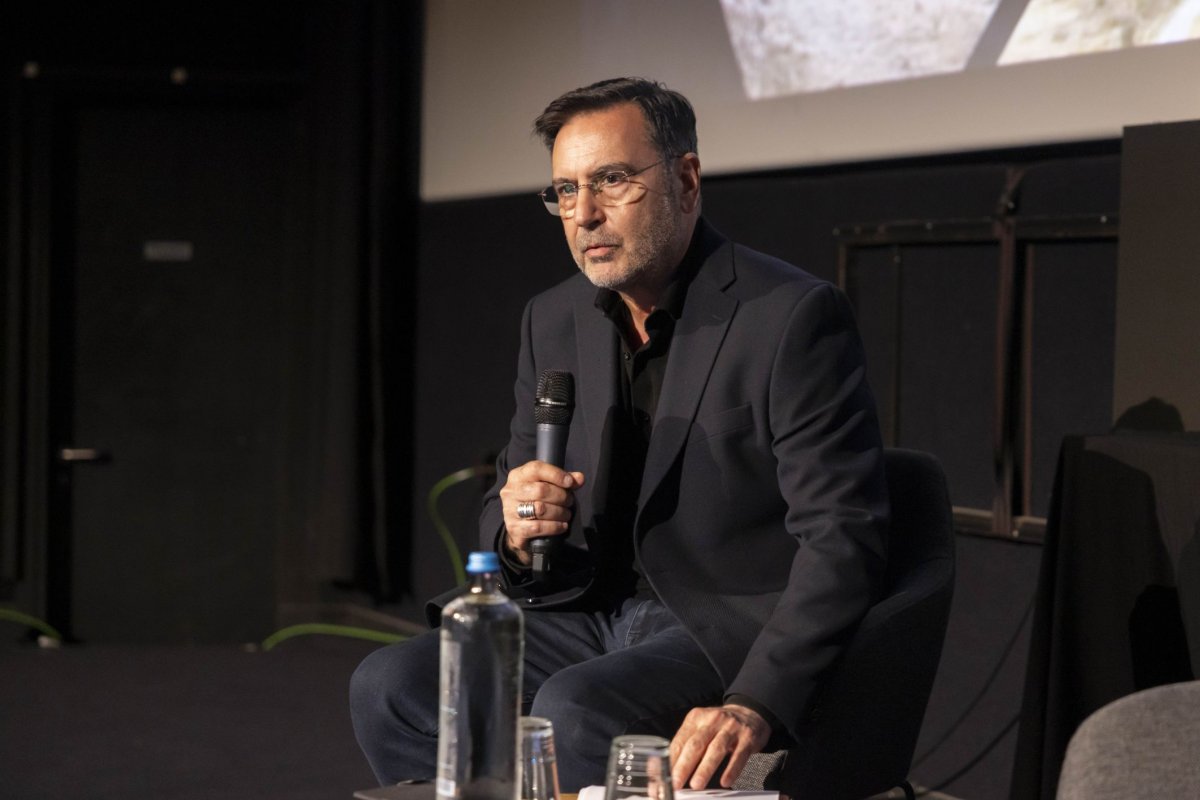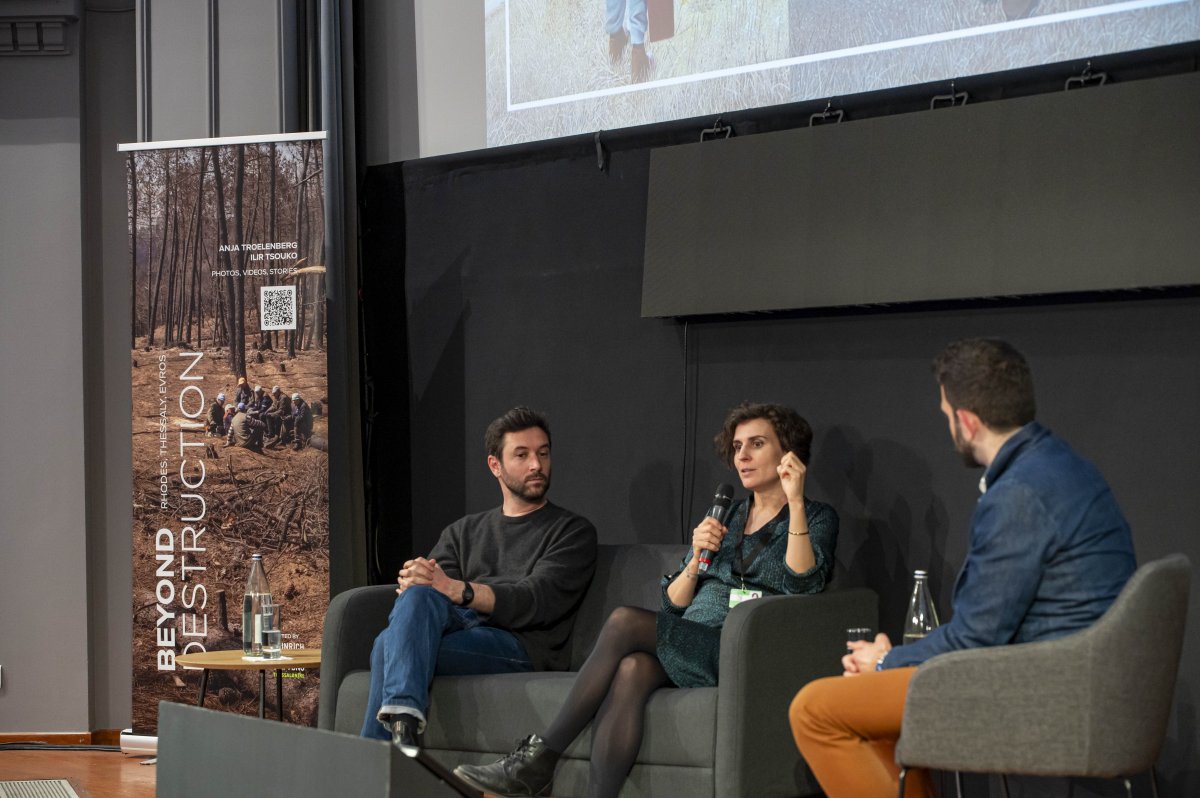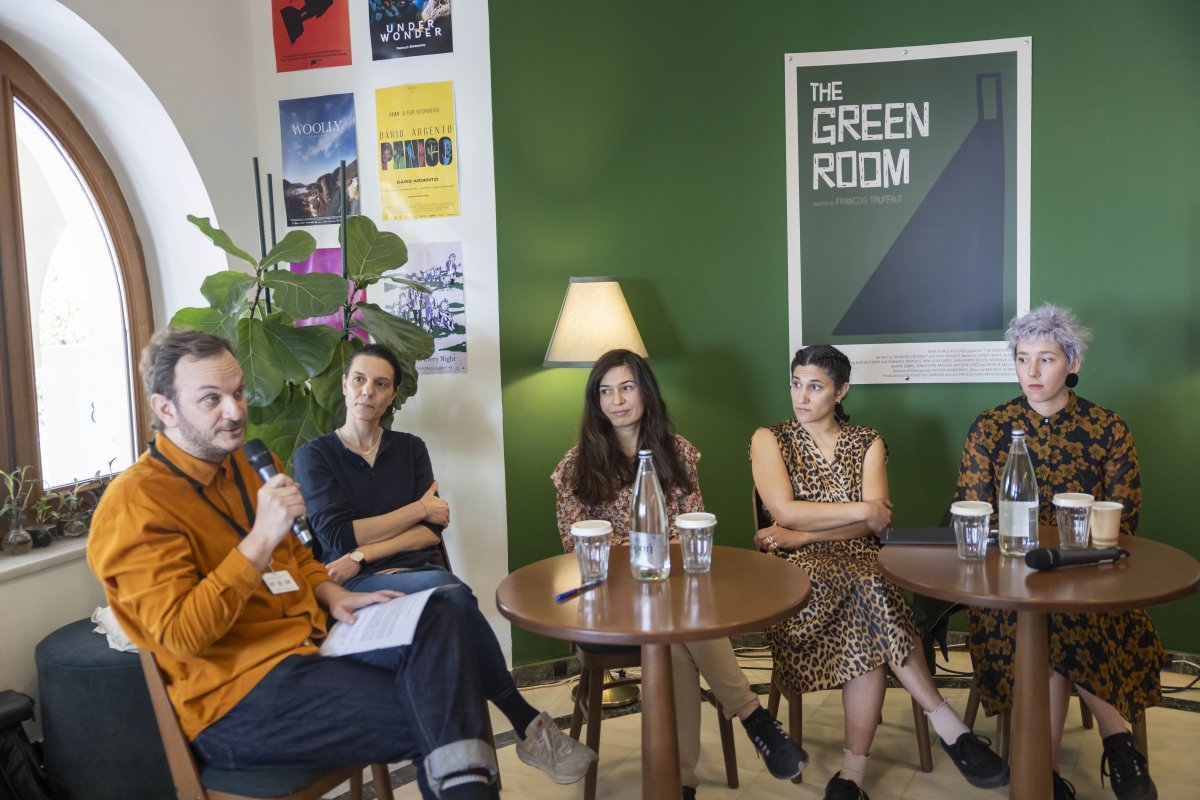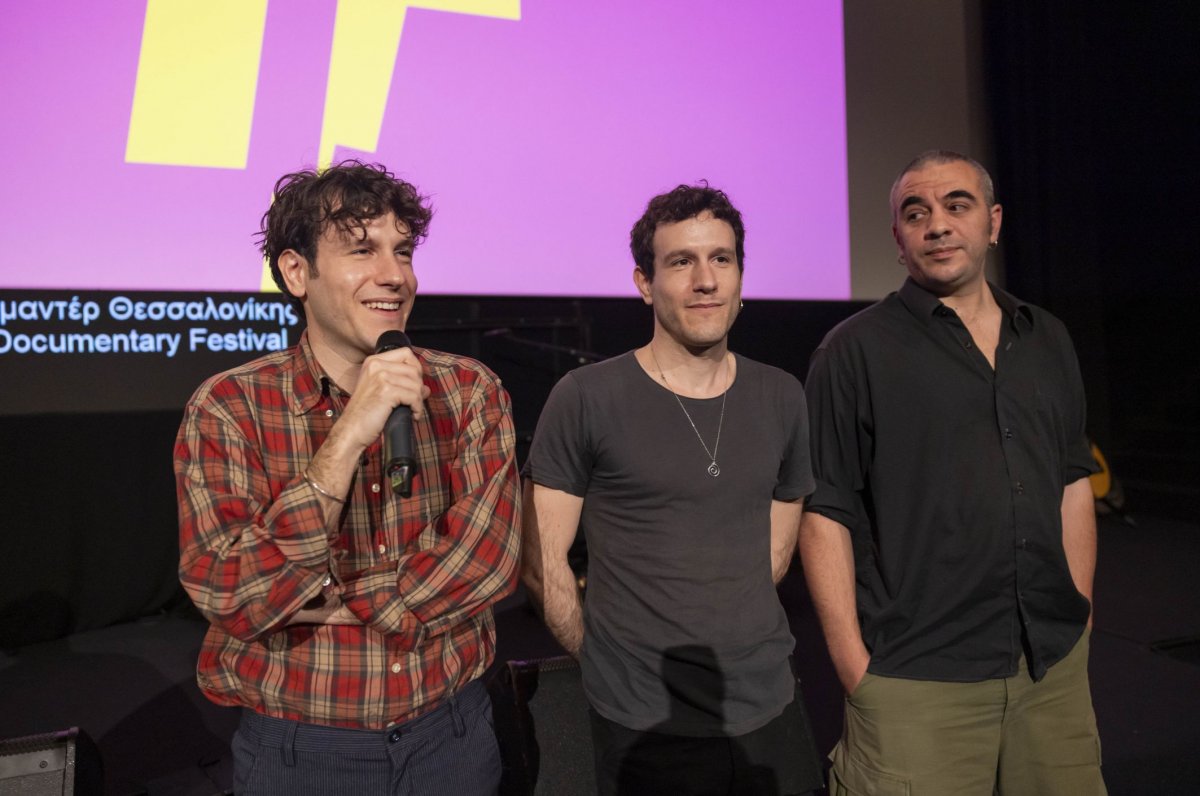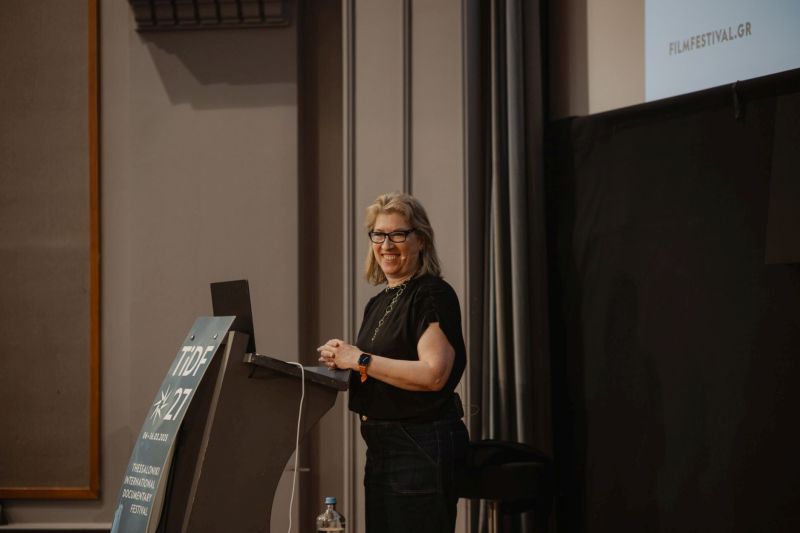24th THESSALONIKI DOCUMENTARY FESTIVAL // 10-20/3/2022
The Greek documentaries of the 24th TDF
Greek documentaries, vibrant, multifaceted and pluralistic, take center stage at the 24th Thessaloniki Documentary Festival, which will be held from 10 to 20 March 2022, both in physical spaces and online. Within the framework of the 24th TDF, 77 full-length and short docs are screened as part of the three competition sections - International Competition, Newcomers and >>Film Forward - the Open Horizons section of the international program, as well as the Platform and From screen to Screen subsections of the Greek program. The movies encompassed in the three competition sections, as well as in the Open Horizons section, will be screened both physically and online, while the Platform and From screen to Screen movies will be screened exclusively online, through the digital platform of the Festival. The above-mentioned movies will be available throughout the entire duration of the Festival or up until the maximum number of available screenings is reached.
Taking into account the difficulties Greek cinema professional are faced up against in their work, but also the supplementary burden imposed by the pandemic on the shoulders of Greek filmmakers, the Festival decided to actively boost Greek documentary for yet another year, disbursing a rental screening fee to every Greek movie featured in the 24 TDF’s program, as a gesture of moral and practical support.
In this year’s edition, the of the universally accessible screenings is making a first in the physical screenings of the Documentary Festival. The audience will have the opportunity to enjoy the film The Grocer (2013) by Dimitris Koutsiabasakos, in a universally accessible screening that will be held in collaboration with Alpha Bank, the Festival’s accessibility sponsor. Koutsiabasakos’ documentary, bestowed with the Audience Award within the context of the 15th Thessaloniki Documentary Festival, will be accessible both in the Festival’s theaters and its online screenings.
Portraits of artists, the refugee-immigrant drama, LGBTQI+ issues, historical and social events that left their mark on the collective psyche, the unseen impact of the pandemic, stories of female empowerment and gender violence, as well as the fading traditions and customs of the Greek folklore heritage, are among the themes touched upon by Greek documentary filmmakers. The advisory commission that took on the task of preselecting the movies for the 24th Thessaloniki Documentary Festival was composed of film director and journalist Marianna Kakaounaki, film director Andreas Siadimas and film critic and journalist Tasos Chatziefraimidis.
As to the special screenings of this year’s Documentary Festival, the film that stands out is no other than The City and the City by Syllas Tzoumerkas and Christos Passalis, which runs through seven decades of Thessaloniki’s history, delving into the bitter ordeals suffered by the city’s Jewish community. The movie celebrated its world premiere at the Encounters competition section of the recent Berlinale. Another much-anticipated film in this section is the landmark documentary Tragedy in the Aegean Sea (1961) by Vasilis Maros, which records and unfolds the most prolific and tragic events of the 20th century Greek history. In addition, the 24th TDF will showcase 12 Greek documentary gems of the past, as part of the initiative “Motherland, I See You: The 20th Century of Greek Cinema”, hosted by the Hellenic Film Academy. This action, first held within the framework of the 62nd Thessaloniki Film Festival, last November, is a program dedicated to salvaging, digitizing, screening and studying films from the rich legacy of 20th-century Greek cinema.
Let us unveil the Greek documentaries of the 24th TDF.
International Competition
Femicidio by Nina Maria Paschalidou
From Italy’s northern cities, to its southern shores and islands, cases of violence and murder against women rocked the country. Laura Roveri, from Verona, was stabbed 15 times by her former boyfriend. She survived the attack and has become an inspiring role model for women across the country. In Italy, one woman is murdered every three days. Nunzia Maiorano, Alba Chiara Baroni and Lorena Quaranta were murdered by their partners. Their families and friends relive the horror as they seek to understand the growing phenomenon of femicide.
the Other Half by Giorgos Moutafis
For 15 years, a photojournalist bears witness to migrant journeys across the dark crossings of European borders. His camera delves into inaccessible places, documenting the stories of people who push human boundaries, to reveal how the Other Half lives.
Tilos Weddings by Panayotis Evangelidis
In the year 2008 the mayor of the island of Tilos in the Aegean Sea agreed to perform the first gay and lesbian civil marriages ever done in Greece. The film follows the story of these two civil marriages from material that was shot then ad hoc and also the gay Pride of the same year, press conferences and other demonstrations concerning the same.
Newcomers Competition
Frugal Abundance by Frantzeska Romanou & Yorgos Savoglou
Vangelis is an old man who has been living for 30 years in a makeshift cabin at the edge of a rock on Cape Maleas in Peloponnese. His house has neither lock nor electricity, and he travels all year round on his bicycle. This is a snapshot of his simple way of life and how self-sufficient he has become in return
Arm Wrestler by Yorgos Goussis
Panagiotis moved from Athens to the countryside. Soon he gets upset with the mentality of the small society and decides to go back. His return to Athens will soon reveal new problems. On this journey of adulthood, he will be called upon to face in a “bras de fer” battle his difficult opponent: the muscular male who oppresses his pure self.
Final Year by Lucas Paleocrassas
Sophia, Lhord, Alexandros and Nikos have a hard time finding their place in a school that ignores their needs. They have to cope with the pressure of the Panhellenic exams when their lives are put on hold because of a student occupation that imposes a school lockdown…
>>Film Forward Competition
IODINE - Greece on the Ruins of Missolonghi by Orfeas Peretzis
Inspired by Delacroix’s painting “Greece on the Ruins of Missolonghi”, the filmmaker visits this lagoon-bound town. He records his thoughts, the daily life of the youths, he converses with local artists and poets in search of a connection between the painting and contemporary Messolonghi.
Last Voyage by Aris Chatzistefanou
Famous Greek artists Yannis Aggelakas and Olia Lazaridou read excerpts from the book A Journal of Two Voyages by Nikos Kazantzakis, while director Aris Chatzistefanou juxtaposes the narration with footage from modern Japan, combined with manga, anime, and video games. An ode to the last journey of the author that shaped his worldview and cost him his life.
Letter to Nikola by Hara Kaminara
Through this film, which takes the form of an audiovisual letter, the testimony of a photographer is born who narrates to her unborn child her experience on the rescue ship Aquarius, in the central Mediterranean.
>>Film Forward Shorts
Iota Period Omega by Alexis Alexiou
Shot on 8mm, Iota Period Omega is a sci-fi documentary. I.O is a girl from a future society, who works for the air force. As she waits to be teleported to a distant planet, through her visual diary that comprises fragments of memories and thoughts, she converses with our present time in an attempt to safeguard the memory of things worth preserving.
Open Horizons
A School Year Is like a Marriage by Georgios Giannopoulos
George works as a computer science teacher at an Athenian night school and tries to cope with the flood of problems caused by the pandemic. The heavy policing and the demands coming from the state and from his mother are constantly increasing. Will George be able to protect his mental and emotional balance? Maybe marriage is the solution.
Airland by Haris Raftogiannis
“Reality does not exist”: This is the motto of the chaotic and open music band named “Aera Patera.” When time comes for some band members, who are exhausted by the never-ending haywire, to ask for some structure, Jimmy, the band’s informal leader, has to either compromise or combat against a reality that “does not exist.”
All that Rain Washed Away by Ioanna Tsilili
A walk around down-town Athens evokes the director’s memories from an era of early youth. A walk as if it is a love letter to lovers and selves of the past. Questions about how female identity is hammered rise in a circular motion, like in the eternal circle of sun and rain, life and death.
An Other Place by Panos Papagiannis & Dimitris Kalaitzis
Mount Athos is a recollection of divinity. A place that constantly shapeshifts, similarly to the way mountain ridges change as we wander around them. A place whose residents experience a total breach of the traditional notion of time.
Arcadia, Champagne d’Orient by Kostas Spiropoulos
Welcome to the Papanikolaou Brothers Winery: Meet the patriarch father, the visionary son Vassilis, the adventurer brother Nikos, and a mother as strict as Cerberus. Producing Arcadian effervescent wines since 1885, they dream to transform the region into the Champagne of the East. The family’s inner conflicts and their competitors will lead them to a tragic end. A story about wine and greed.
Broken Sound by Fivos Kontogiannis
Through the history of bouzouki, Broken Sound offers an overview of the narrative, as well as a cultural identity of modern Greek society. Although consumerism, globalization and digitalization of our social interactions felt as if the tradition of bouzouki and folklore music would fade with time, a new generation of young bouzouki players and bearers of its authentic culture emerged. A collective character of bouzouki players is composed through interviews of major figures in the modern history of bouzouki, but also archive material from films, TV recordings and live performances.
FAREWELL - The Memory of the Land by Stavros Psillakis
“Thousands of fighters around the world had given all they had for a cause that, as they believed, as they said, was greater than them; but in the end, it turned out that they themselves were the greatness of that cause”, once told Chris Marker. An 87-year-old persecuted and declared guerrilla, Giannis Lionakis, bids a farewell trip to the place that defined his life.
Far.Go.Bots by Angelos Tsaousis
It is common within Romani communities for children at the age of 13 to drop out of school to get married. But this is not the case of the children of the first-ever Roma Robotics team, who struggle to overcome the segregation of their community, travel all the way to the USA, finish school and change their life paths.
Ι Saw a City by Stelios Efstathopoulos
I saw a city, which unexpectedly lost its sounds. Only the hum of the air remained. A city that exists on the fringes of our gaze. While wandering around the city, I stumble across short everyday stories, starring anonymous passers-by. This wandering reveals a new reality that leads us down a whole different path of questions and contemplation.
Into the Land of Ice and Fire
The film is inspired by the contemporary life of the indigenous people inhabiting the European Arctic region, the Sámi. Two parallel stories are gradually unfolding the everyday life of two very different persons: 86-year-old Sara and Mihka, a 7-year-old Sámi boy, both living in Guovdageaidnu, in the middle of the Norwegian Arctic tundra.
Live-in by Laura Maragoudaki, Tatiana Mavromati
Live-in is a portrait of domestic work, as experienced by Georgian live-in maids working in Greece. It explores the monotonous, demanding & unseen labor behind care work, and the isolation and insecurity experienced by women who must work to serve others, 24 hours a day, 6 days a week, with only one Sunday off.
Memories with a Tail by Dimitris Indares
A 90-year-old painter, a neuroscientist, and a marine ecology biologist meet in Αmvrakikos bay, an ecosystem of great natural wealth and history. Among eels, wet landscapes, and watercolors, the past is recalled on the scale of microhistory, along with the survival conditions of a generation that emerged from the war persistent and resilient.
My Grandfather Papaflessas by Kleoni Flessa
A tender look at the hero of the Greek Revolution of 1821. Papaflessas traveled to Constantinople in the age of enlightenment and romanticism, and became a member of the revolutionary organization “Filiki Eteria” (Society of Friends), taking on the task of inciting his compatriots against the Ottoman Empire. What sets the heroes apart? Do they have mitigating factors?
Nowhere to Go by Lukas Agelastos & Spiridoula Gouskou
Thousands of homeless people in Greece are experiencing social exclusion. At the same time, the state does not assume its responsibilities, violating social and human rights. As it follows the lives and problems of three homeless people in Athens, the documentary explores the state’s failure to provide a safety net and examines possible solutions.
The Bet by Maria Leonida
Quarantine and distance learning, 2021. The camera follows students and teachers and records how this unprecedented experience formed their relationships, on and off screen. Confidence in an "open" school allows the camera lens to reveal emotions, difficulties and impasses. Τhe viewer will decide who finally wins physical presence or e-learning?
The Downtown Refuge by Fenia Papadodima
Omonia 2021. The worst place in Athens. Junkies, hookers, hopeless immigrants. Here existed for a hundred years, a refuge for the destitute and poor. The Athens' Polyclinic founded by Alivizatos brothers. A hospital for the body and soul. Saint Porphyrios served there, soothing every troubled soul that entered Polyclinic's small church for 33 years.
The Itinerary by Orestis Athanasopoulos
Following a bus service that delivers food parcels and miscellaneous items to Greeks living in Western Europe, this film looks at how people use material goods to construct relationships with a real and imagined homeland.
The Pomegranates of Nagorno Karabakh by Thomas Sideris
A cinematic recording of the uprooting and wandering of the people of Nagorno-Karabakh, with pomegranate as the central reference axis, who have counted thousands of dead over the past four decades, and their movement in gray and rainy landscapes where no one knows what is their own, where their borders are and what their homeland is.
The Promise by Kostas Pliakos
The practice of cremation of the dead in Greece had been a taboo for decades both for politicians and the Orthodox Church. It took 23 years of struggling, on many levels, to finally have legislation to allow the creation of the first crematorium in Greece. The Promise records the political dimension of this fight, which a man gave almost all alone.
The Students of Umberto Primo by Alessandra Maioletti
Thessaloniki, Greece, under Nazi occupation. 96% of the Jewish population is sent to Auschwitz. The adventures, hopes and dreams of 9 Jewish students of the Italian School Umberto Primo come to life, based on the archive found by an Italian professor and on two of the protagonists’ testimonies.
Voutes by Anastasios Gkinosatis
Voutes is a film depicting Perama, a working-class district of Athens, by following Panayiotis and Fotis. The film observes their pigeon keeping practice, documents their narratives, presents their relationship with the other pigeon-fanciers and follows them around the suburb.
Women Fighters - The Triple Liberation by Leonidas Vardaros
Women’s political and social struggles in the 20th century, surviving prison, exile, and facing the firing squads. They were punished for their struggle for a better life and for fighting the Nazis, seeking national independence and democracy.
Platform
+1 by Argyris Liapis
Anna-Maria takes her first steps in life. Orestis takes his first professional steps in painting. Maria finishes high school and makes dreams for her future. All three of them were born with an extra chromosome. All three of them were born with Down Syndrome. They live in Thessaloniki and they are the main characters of this documentary.
5 ½ Years by Myrto Symeonidou & Ioanna Papaioannou
In October 2020, the biggest trial in modern Greece comes to an end. The court ruling is clear: The Parliament’s third-largest party over several years is a criminal organization. What is it like to cover such a trial for five and a half years? A conversation with the people who were there.
21 - The Battle of the Square / Behind the Sketches by Meletis Miras
The documentary follows the research and creative process, the timeline and set-up of the greatest Greek graphic novel to this day. A story about archives, storyboards, pencils, papers, and ink, featuring conversations between Soloup and the team of researchers at the National Historical Museum about the “hows“ and “whys“ of history.
100% Raptopoulos by Savvas Houliaras
Vangelis Raptopoulos. Τhe creator of popular novels such as Diodia (Tolls), Ta tzitzikia (The Cicadas), O ergenis (The Bachelor), and Loula, among others, completed forty years of writing activity in 2019. In his whole career, he has delivered thirty titles, some of which have been successfully adapted for cinema, theater, and television.
Agape (Love) is the Most Beautiful Word in Greek: Unaccompanied Refugee Minors in Greek Schools by Gina Georgiadou
Unaccompanied minor refugees in Greece. Where do they come from; how and why? What are their needs and dreams? Do they go to school like other children of their age? How do they feel there? The crucial question determining their future: “Whose children are these?”. The Greek volunteer group “Foster Teachers” contributed with this film to the National Geographic Society project “Teaching to Hope: Saving the education of refugee teens during and after the pandemic's school shutdowns”
Alphonso Ford - Score Until the Last Day by Aris Tsiaras
Alphonso Ford was a successful basketball player, carrying a big secret. Far from the bright lights of the basketball courts, Ford was fading away with leukemia. This is the incredible story of one of the biggest scorers that ever played in Europe and at the same time the story of the greatest American basketball player, Americans have never heard of.
Anthropause by Christos Godas
On a Greek island named Symi, people believe in miracles. The film starts from there, in 2018, to explore the relationship of man with faith and knowledge, physics and metaphysics. Faith is something personal and inner. Knowledge and how man handles it concern society and citizens. The filming of empty New York city, because of the pandemic, in 2020, raises thoughts and questions, which unpredictably, almost metaphysically much and complement each other with the footage that had been shot two years before.
Apeiros by Themistocles Lambridis
A childhood dream of riding the virgin mountains of Northern Greece becomes reality when a group of mountain bikers explores an untracked terrain; a journey that pushes their limits and tests their desire for freedom during difficult times.
Assomoud - House of the Resilient Children by Francesca Zonaras
Since 1948, Lebanon has hosted a large community of Palestinians who escaped from their land. Even confined in the camps, members of the Palestinian community get organized and build places of resilience. Assomoud (House of the Resilient Children) represents an oasis of joy and peace within the situation of misery, decay, and political deadlock in Lebanon.
Boudalia by Konstantinos Ioakeimidis
The film is a record of the course of a group of young people from a small village in Crete, through a revue, concentrating the love of contributors and audience for over 20 years. The way they managed to make their truth enviable is a suggestion to how societies of all kinds can accordingly create something so healthy and happy.
“By the Light of Thine Lights” – 200 Years of Greece by Constantin Pilavios
The documentary unravels the thread of a journey that began with the Revolution of 1821 and evolved over the following 200 years. It is a visual narrative of the course of modern Greece, seen as a mosaic of archives and documents.
Chimera by Nikos Kostopoulos
Chimera focuses on events that took place in Vukovar, Croatia, in November 1991. With the use of symbolic reenactments and archival footage, it creates a juxtaposition of court archives of the ICTY and news media narratives during the Yugoslav Wars, to investigate the dangers of mis- and disinformation by the media.
Chronis Botsoglou: “I Was There Too and I Was Treated with a Plate of Lentil Soup …” by Freddy Vianellis
Chronis Botsoglou, acclaimed painter, professor, and lecturer at the Athens School of Fine Arts, is revealed through his lifelong work. His work unfolds through a discussion with his wife and muse, Eleni. Interviews with fellow painters, art historians, and curators, as well as unpublished work, complete the painter’s profile.
Clean Cities by Marina Danezi, Kostas Mandilas, Constantinos Hadzinikolaou, Christos Sarris
Onassis Stegi’s well-traveled production Clean City has prompted a hybrid film, honoring the women who clean the cities of the world. Four different directors follow the work as it tours four cities: Skopje, Sarajevo, Montpellier, and Istanbul.
Crafting Futures by Michalis Kastanidis & Io Chaviara
Having experienced multiple losses and passed through difficult journeys, many people may see their displacement getting protracted, as they face migration regimes. Yet their lives are not only marked by immobility and victimhood, as often misguidedly assumed. Many people struggle on a daily basis, they learn and create, they connect with places and other people, they resist and move on.
Feel Your Heartbeat: The Film by Periklis Papandreopoulos
Feel Your Heartbeat: The Film is the first documentary to tackle the deep roots of house music alongside its cultural history and evolution in Greece. From the underground party scene of 1989 to the economic crisis of Greece and the covid era of the late 2020s.
Hellenic Places: Hermoupolis by Charalambos Margaritis
The city of Hermoupolis, capital of Syros, is located at the center of the Cyclades, in the Aegean Sea, in Greece. In its history one can find all the elements that shaped contemporary Greece. This is an animated documentary telling its story.
Improvisation in Parallel Mode by Petros Kolotouros
Through the endeavor with musicians of different cultural backgrounds and with the combination of soundscapes and images of the places we visited, the movie explores sonic realities and how these can relate to a poetic visual language. The project is based upon improvisation and collective creativity.
Indigenius Loci by Vicky Markolefa
A psycho-geographic documentary film that explores the interface of man and nature. Vasilis Fourkiotis, deep ecologist, shepherd, and sociologist strides across his ancestral lands immersed in spiritual reflections of a postmodern world.
Microbiome by Stavros Petropoulos
The limits of intrusion in the peaceful lives of Ikarians are being tested in scientists' quest for the secret for long and healthy life. A clash of energies between locals and perplexed scientists, leaving no stone unturned, to understand frozen time and intriguing idiosyncrasies. A comedic study in pacing and reframing a world view.
Rooms with a View by Nickolas Papadimitriou and Nikoleta Parashi
In the film Rooms with a View we observe the transformation of a building in the heart of Athens from a space which has traditionally been occupied by goldsmiths to a luxurious boutique hotel. During our stay we come to experience three different levels of coexistence.
Shadow Fighting by Katerina Eleonora Tsialiou
Three women, martial arts masters, talk about their encounters with men and patriarchy, inside and outside their sports field. Their personal experiences appear quite complex and can be translated in many ways. Each woman witnesses and processes reality, in her own unique way.
The Aging Land by Giorgos Oikonomou & Dimitris Trompoukis
Focusing on the Mastorochoria of Konitsa, the documentary attempts to raise questions about the Greek countryside throughout the years, the meaning of space and the love for our place. It also seeks to highlight the immeasurable values that can be a catalyst for the revitalization of these villages.
The Autistic Character in Greek Cinema by Maria Papadopoulou
A documentary that explores the autistic film character and the way that is presented in Greek cinema. Many well-known directors, screenwriters, and actors describe how they approached the autistic character in their films.
The Brigands’ Chieftain by Marios Gasparis
The life, action, and death of the brigand Fotis Yiagoulas, whose head (next to the ones of his comrades Babanis and Tsamitras) was hanged at the train station of the city of Katerini, in September 1925. Yiagoulas was a controversial persona, accused of 54 murders. Following his execution, the era of brigandage in Greece comes to an end.
The Day the Birds Silenced by Spyridon Anagnostou
Kastoria at the beginning of the 20th century. A father moves abroad. The war begins, the borders closed and a mother is left behind with their two young children. Moving to Kleisoura was the best thing to do. But who can escape from his destiny? The 5th of April 1944, the day the birds silenced. A documentary about the massacre of Kleisoura.
The Greek Bar Jacket by Marianna Economou
The Greek Bar Jacket offers a unique glimpse into the making of Dior's emblematic Cruise Show 2022 show at the Panathenaic Stadium in Athens. The film captures how the worlds of haute couture and local folk art come together to produce a highly ambitious runway show, marked by a stunning display of local craftsmanship.
The Improvisation of Petros Mokas by Tasos Georgiou
Petros Mokas is a fifth-generation shepherd, living in the mountains of Pindos. He fosters butsko, a rare sheep breed that lives and grows in the grasslands of Eastern Tzoumerka on the same mountain range. We follow his life, his music, and his traditions.
The Jews of Corfu by Mirjan Gjergjevica
Jews of Corfu: A population group that was an important part of the island, contributed to the formation of its history, and contributed to the development of trade and economy. But the tragic events that befell them were added to the black page of human history.
The Last Child of Arki Island by Clémentine Athanasiadis και Sébastien Daguerressar
Christos is 12 years old. He is the last child of Arki, a small island located in the far east of Greece. Less than forty inhabitants live there all year round. For the last four years, the primary public school has remained open for one pupil only. Maria Tsialera, Christos' teacher, travels every week to Arki from the neighboring island where she lives to ensure his schooling, convinced that learning is essential for the development of this insular child. At the end of his primary school years, Christos might work with his parents and his older brothers in the family farm. But Maria Tsialera is doing whatever she can for him to continue his scholarship on another island.
The Place Between Was & Will Be by Theo Panagopoulos
After his grandfather is diagnosed with dementia, the filmmaker conducts a ritual of anticipatory grief in his grandparents’ abandoned summer house. By using the concept of liminality to explore the house's past, present and uncertain future, he aims to slow down the moment of a big change and open a discourse his family avoids to have.
The Sound of Colors by Panagiotis Papoutsis
Yiannis Sygletos collaborated with the greatest orchestras on the planet, as well as with the most important Greek artists and all this thanks to his great teacher, Manos Hadjidakis. Having worked for many years as a sound engineer at ERT S.A (greek public radio) and the ''Orchestra of Colors'', he introduces us to the magical world of sound recording and music.
The Sound of Folk by Yannis Christidis
Unveiling the cultural, social and political roots of folk dances through the eyes, body and ears of passionate dancers, this documentary exposes the creative, collective and communal character of one of the world's most ancient dance styles.
Time Taking Shape: 1821 Before and After by Kyriakos Gikas & Kyriaki Virou
The documentary Time Taking Shape: 1821 Before and After examines the terms in which the past is preserved, exposed and conversed with our present. In the documentary, we follow the stages of preparation for the Benaki Museum's exhibition “1821 Before and After” and at the same time the creation of a narrative about history and identity.
Third Place Ticket by Yorgos Kikidis & Panagiotis Papadopoulos
With this research documentary, we aim to emphasize the huge role played by the theatrical herds after the establishment of the modern Greek state in the course and development of the Greek theater.
What Remained of Nikos Louvris? by Nikos Theodosiou
The cinematic endeavors of a person commonly known as “Nikos Louvris” from May ’68 in Paris until the first years of the transition to democracy in Athens.
Where Do the Kids Fly? by Yorgos Chr. Zervas
The documentary reflects on the phenomenon of addiction and the vocation of rehabilitation. It investigates the transition from the interwar coercive inhuman system of dealing with addictions to a human-centered, free, diverse therapeutic network of rehabilitation, established for decades in Greece
Vidisova by George Panagopoulos
Mr. Tasos, a 68-year-old, rebuilt the house of his childhood memories with his hands, in a small village, that was destroyed collectively by its own residents in the late 60s in order for them to receive earthquake compensations and build a new village closer to the main road. A short documentary about memory, the passage of time and regret.
From screen to Screen
Christos Bokoros by Michalis Lykoudis
Through a wandering around the locations that have inspired his art, Christos Bokoros unravels his thoughts and his painting technique. The camera meets him in his atelier in Athens, but also in Viniani – a historical village in the mountainous area of Agrafa in Western Greece.
From “Me” to “We”: Emmanouil Benakis, a Fascinating Life by Nikos Megrelis
A journey from the multicultural Alexandria of the 19th century to twentieth-century Athens, following the economic, social, and political life of Emmanouil Benakis and the imprint of his donations.
Macedonian Skies Ablaze – Wings of the Great War by Dimitris Chatzimalis
During the Great War at the Macedonian front (Serbia, Bulgaria, Greece, Turkey) catalytic events took place and faded into obscurity. Each one shaped the progress of the Great War and changed the tides of history forever. Tales of boldness and courage were recorded as legends among the first aviators of the warring parties.
Marios Giannakou - Chasing the Impossible by Maria Giannouli
From a chain smoking self-exiled couch potato, Marios Giannakou became the youngest athlete ever to run cross country the “Al Marmoom” (the longest desert marathon in the world), promulgating that nothing is impossible to achieve.
Memories Fossilized Deep Inside Her by Tania Chatzigeorgiou
The third episode-part of the documentary series refers to memories of the last women survivors who lived the horror of the 2nd World War. Some are no longer alive. Women that they deprived of their families, food, expression, dignity. Women who are struggling with horror memories composing the micro-history of Greece.
North Evia: Stories from a scorched-earth by Konstantis Frangopoulos
An earthly paradise surrendered to a fiery hell. The aftermath from the fires in Northern Evia is a tragic one. Half a million acres were reduced to ashes. How can the people who lived from the forest and saw homes and possessions surrendered to the flames start their lives again from scratch?
Relationship Violence by Niovi Anazikou
Mostly gender-based violence is caused by the husband/partner in extreme forms it escalates into femicide. In Greece the pandemic gave visibility to the phenomenon yet violent incidents are rooted in gender inequality. The documentary investigates violence against women, highlighting it through the survivor’s narratives.
Special Screenings
The City and the City by Christos Passalis and Syllas Tzoumerkas
Six chapters depicting the life and the ordeals of the Jewish community of Thessaloniki are intertwined with today’s city. The past and the present of a city are bound together, finding their point of convergence in its cracks. A co-production of the Greek National Opera and Homemade Films, with the collaboration of the Thessaloniki Film Festival, undertaken by Maria Drandaki and curated by Orestis Andreadakis. The project was granted the support of the Stavros Niarchos Foundation, within the framework of its contribution to the anniversary program hosted by the Greek National Opera for the completion of 200 years since the outbreak of the 1821 Greek Revolution, as well as of the Claims Conference - the Conference of Jewish Material Claims Against Germany, the Greek-German Fund for the Future, the Rosa Luxemburg Stiftung - Office in Greece, EKOME, the Culture Centre of the Region of Central Macedonia, MOMus, the Greek Film Centre, and Israeli Community of Thessaloniki.
The Grocer by Dimitris Koutsiabasakos
Nikos Anastasiou, a Greek traveling grocer has been making the same itinerary with his wife Sophia since 1980. Once a week, all year long, starting from Trikala, they visit the abandoned villages of the SW Pindos mountains, a 75 kilometers drive. In the past few years, their two sons, Kostas and Thimios, have helped them. The documentary follows their journey through the changing of the seasons, morphing into a fascinating and often touching road movie about a little-known side of Greece.
Tragedy in the Aegean Sea by Vasilis Maros
A documentary on the Greek history of the first half of the 20th century, from the Balkan wars until December events, with a special emphasis on the Asia Minor catastrophe and its aftermath, through filmed documents by Joseph Hep, George Prokopiou, Achilleas Mandras, Philopimenas Finos, Gabriel Loggos and Kyriakos Kourbetis.
Dimitris Skyllas: afterpop by Dimitris Zivopoulos
From the Greek mountains to BBC’s grand stages, the 35-year-old provocative composer Dimitris Skyllas reveals the secrets of today's music-making. The sacred musician, the party freak, and all the life in between. A visionary gesture to break the stereotypes of classical music in our fast, pop-consuming universe.
Motherland, I See You
Megara by Sakis Maniatis & Yorgos Tsemberopoulos
The uprising of the Megara residents against the military Junta’s decision to expropriate a large rural area with the purpose of installing an oil refinery, and the final outcome of their struggle. The first Greek film to ever address ecological issues empathizes with the farmers’ agony, whose words have rarely been depicted in Greek cinema with such clarity, vividly outlining the image of a country bordering on the threshold of change.
ROM by Menelaos Karamaghiolis
In 1979, the UN officially recognized gypsies under the name ROM. A decade later, this bold documentary brings forth the term for the first time in Greece. Delicately intertwining myth with historical reality and touches of magic with sociological observation, Karamaghiolis strays away from linear narration, tracing the evolution of Roma tradition through history, amidst a social entourage of violent rejection.
The Struggle of the Blind by Maria Chatzimichali-Papaliou
In 1976, hundreds of blind activists took over the “House of the Blind”, in the culmination of a 2-year mobilization demanding “Bread, Education and not Beggary” (paraphrasing the anti-dictatorship slogan “Bread, Education, Liberty” of the time). Chatzimihali-Papaliou’s documentary becomes part of the struggle it portrays, as its numerous screenings abroad help to establish a current of support against the oppression of the blind population of Greece, embraced among others by Jean-Paul Sartre, Simon de Beauvoir and Michel Foucault.
Letters from America by Lakis Papastathis
The course of an immigrant’s life, as narrated by himself through a parcel of 120 postcards and photos, is transformed into a documentation of an entire nation’s uprooting. Through the real keepsakes of an expatriate, Lakis Papastathis deciphers a life of uprooting, delivering a spectacular cinema document that portrays the experience of nostalgia in an original and deeply humane manner.
Last Stop, Creuzberg by Giorgos Karypidis
Life, its problems and the collective political action of the gastarbeiters are under the scope of this exquisite documentary of Giorgos Karypidis. An immigrant himself, in various stages of his life, the filmmaker breaks free of any narrative and sentimental shortcut, grasping a piece of the common agony suffered by entire generations of uprooted people.
The Other Letter by Lambros Liaropoulos
The first and last full-length film by Lampros Liaropoulos is an autobiographical recording, but also a comment on the crucial decade between 1965 and 1975, the smoothening qualities of time and the ever-changing facet of our world. This hybrid film document, where the short films Letter from Charleroi and Athens City Smile are bound together, the city, the country, an entire era and the political developments are blended with the auteur cinema.
Thirean Matins by Kostas Sfikas & Stavros Tornes
A “visual social research” on Santorini that lays its sight on the period when the agricultural economy was gradually replaced by the swarming tourism industry. The movie exceeds the limitations of a simple folklore documentary, weaving a haunting portrait of a two-tier society, like the ominous vision of a future that had already arrived. A unique encounter between two great directors that has secured its prestigious place in the collection of New York’s Museum of Modern Art.
Fournoi, A Female Society by Alinda Dimitriou & Nikos Kanakis
In Fourni, a little island neighboring Ikaria, a researcher is recording the everyday life of the inhabitants. Through a methodology of oral history, demanding a striking devotion, Demetriou and Kanakis perfectionate a type of political documentary that interweaves observation, ideology and social ideals. The feminist glance adopted by their work gives to voices that had been marginalized by the official historical recording, crafting a rare document of frontier life.
Plot by Theodoros Maragos
Life goes by in a vacant lot situated in Petralona, across three seasons of the same year, during the Junta regime. Maragkos, a director of box-office and art-house hits, such as Learn How to Read and Write, Son, in his first attempt in the field of live-action cinema, sprinkles a political manifesto with the spices of his trademark visual sensitivity, offering us a stellar legacy.
Tourkovounia by Lefteris Xanthopoulos
In the highest peak of Tourkovounia hill range, in Athens, the first illegal buildings made their appearance in the 50s, as the new homes of the homeless internal immigrants. Xanthopoulos, armed with a sui generis artistic language and placing gritty urban poetry in the very heart of the documentary genre, contemplates on the notions of uprooting and fleeing, through the narrations of the area’s residents.
Athene by Eva Stefani
1985, Larissa train station in Athens, on a spring night. The graduation film of Eva Stefani not only serves as a prelude to one of the most defining figures of the Greek avant-garde, but also introduces to the world of observational documentary she had dedicated herself to. A documentary that allows the viewer to be immersed in a real-life universe, where the most improbable of people are given a voice, as well as the chance to travel to unexplored corners of their psyche and come up with a definition of their proper world.
Acropolis of Athens by Roviros Manthoulis
This educational documentary by Manthoulis, shot under the archeological guidance of Giannis Miliadis, who also holds the role of the narrator, is now showcased in hundreds of university libraries all over the world. It still stands as a unique and outstandingly accurate mapping of the Acropolis, in terms of objects, spaces, iconography and liaison with history and tradition.





